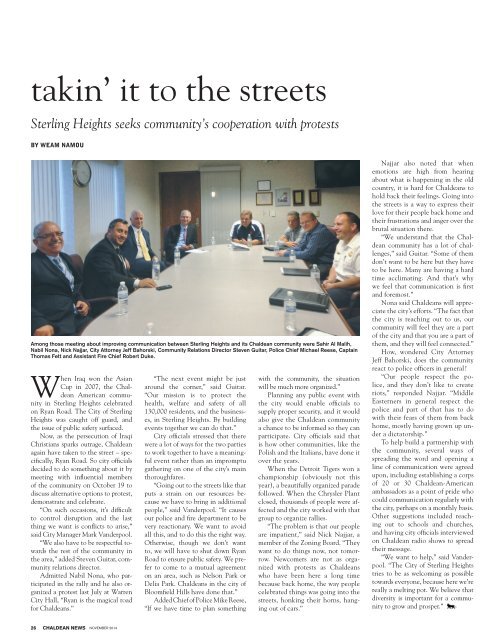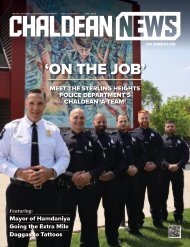You also want an ePaper? Increase the reach of your titles
YUMPU automatically turns print PDFs into web optimized ePapers that Google loves.
takin’ it to the streets<br />
Sterling Heights seeks community’s cooperation with protests<br />
BY WEAM NAMOU<br />
Among those meeting about improving communication between Sterling Heights and its Chaldean community were Sahir Al Malih,<br />
Nabil Nona, Nick Najjar, City Attorney Jeff Bahorski, Community Relations Director Steven Guitar, Police Chief Michael Reese, Captain<br />
Thomas Fett and Assistant Fire Chief Robert Duke.<br />
When Iraq won the Asian<br />
Cup in 2007, the Chaldean<br />
American community<br />
in Sterling Heights celebrated<br />
on Ryan Road. The City of Sterling<br />
Heights was caught off guard, and<br />
the issue of public safety surfaced.<br />
Now, as the persecution of Iraqi<br />
Christians sparks outrage, Chaldean<br />
again have taken to the street – specifically,<br />
Ryan Road. So city officials<br />
decided to do something about it by<br />
meeting with influential members<br />
of the community on October 19 to<br />
discuss alternative options to protest,<br />
demonstrate and celebrate.<br />
“On such occasions, it’s difficult<br />
to control disruption and the last<br />
thing we want is conflicts to arise,”<br />
said City Manager Mark Vanderpool.<br />
“We also have to be respectful towards<br />
the rest of the community in<br />
the area,” added Steven Guitar, community<br />
relations director.<br />
Admitted Nabil Nona, who participated<br />
in the rally and he also organized<br />
a protest last July at Warren<br />
City Hall, “Ryan is the magical road<br />
for Chaldeans.”<br />
“The next event might be just<br />
around the corner,” said Guitar.<br />
“Our mission is to protect the<br />
health, welfare and safety of all<br />
130,000 residents, and the businesses,<br />
in Sterling Heights. By building<br />
events together we can do that.”<br />
City officials stressed that there<br />
were a lot of ways for the two parties<br />
to work together to have a meaningful<br />
event rather than an impromptu<br />
gathering on one of the city’s main<br />
thoroughfares.<br />
“Going out to the streets like that<br />
puts a strain on our resources because<br />
we have to bring in additional<br />
people,” said Vanderpool. “It causes<br />
our police and fire department to be<br />
very reactionary. We want to avoid<br />
all this, and to do this the right way.<br />
Otherwise, though we don’t want<br />
to, we will have to shut down Ryan<br />
Road to ensure public safety. We prefer<br />
to come to a mutual agreement<br />
on an area, such as Nelson Park or<br />
Delia Park. Chaldeans in the city of<br />
Bloomfield Hills have done that.”<br />
Added Chief of Police Mike Reese,<br />
“If we have time to plan something<br />
with the community, the situation<br />
will be much more organized.”<br />
Planning any public event with<br />
the city would enable officials to<br />
supply proper security, and it would<br />
also give the Chaldean community<br />
a chance to be informed so they can<br />
participate. City officials said that<br />
is how other communities, like the<br />
Polish and the Italians, have done it<br />
over the years.<br />
When the Detroit Tigers won a<br />
championship (obviously not this<br />
year), a beautifully organized parade<br />
followed. When the Chrysler Plant<br />
closed, thousands of people were affected<br />
and the city worked with that<br />
group to organize rallies.<br />
“The problem is that our people<br />
are impatient,” said Nick Najjar, a<br />
member of the Zoning Board. “They<br />
want to do things now, not tomorrow.<br />
Newcomers are not as organized<br />
with protests as Chaldeans<br />
who have been here a long time<br />
because back home, the way people<br />
celebrated things was going into the<br />
streets, honking their horns, hanging<br />
out of cars.”<br />
Najjar also noted that when<br />
emotions are high from hearing<br />
about what is happening in the old<br />
country, it is hard for Chaldeans to<br />
hold back their feelings. Going into<br />
the streets is a way to express their<br />
love for their people back home and<br />
their frustrations and anger over the<br />
brutal situation there.<br />
“We understand that the Chaldean<br />
community has a lot of challenges,”<br />
said Guitar. “Some of them<br />
don’t want to be here but they have<br />
to be here. Many are having a hard<br />
time acclimating. And that’s why<br />
we feel that communication is first<br />
and foremost.”<br />
Nona said Chaldeans will appreciate<br />
the city’s efforts. “The fact that<br />
the city is reaching out to us, our<br />
community will feel they are a part<br />
of the city and that you are a part of<br />
them, and they will feel connected.”<br />
How, wondered City Attorney<br />
Jeff Bahorski, does the community<br />
react to police officers in general?<br />
“Our people respect the police,<br />
and they don’t like to create<br />
riots,” responded Najjar. “Middle<br />
Easterners in general respect the<br />
police and part of that has to do<br />
with their fears of them from back<br />
home, mostly having grown up under<br />
a dictatorship.”<br />
To help build a partnership with<br />
the community, several ways of<br />
spreading the word and opening a<br />
line of communication were agreed<br />
upon, including establishing a corps<br />
of 20 or 30 Chaldean-American<br />
ambassadors as a point of pride who<br />
could communication regularly with<br />
the city, perhaps on a monthly basis.<br />
Other suggestions included reaching<br />
out to schools and churches,<br />
and having city officials interviewed<br />
on Chaldean radio shows to spread<br />
their message.<br />
“We want to help,” said Vanderpool.<br />
“The City of Sterling Heights<br />
tries to be as welcoming as possible<br />
towards everyone, because here we’re<br />
really a melting pot. We believe that<br />
diversity is important for a community<br />
to grow and prosper.”<br />
26 CHALDEAN NEWS <strong>NOVEMBER</strong> <strong>2014</strong>

















